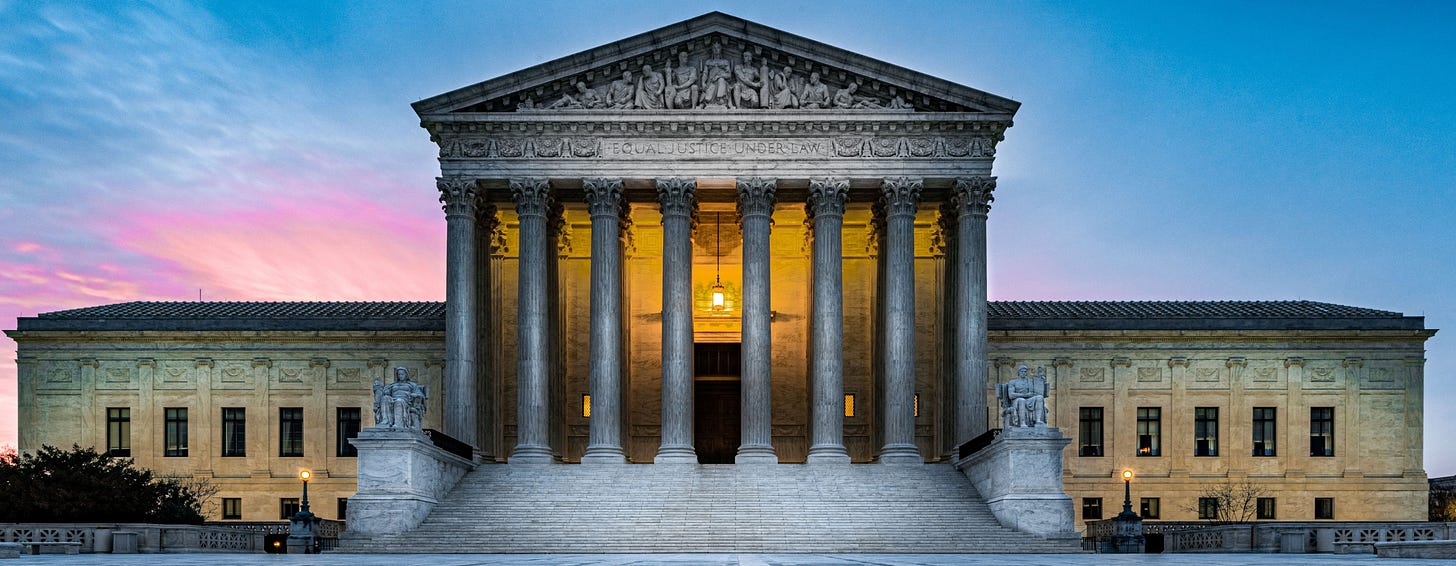E-Pluribus | January 17, 2023
[Don't] go Left, young man; sometimes the system works; and will the Supreme Court finally find its courage on racial preferences?
A round-up of the latest and best writing and musings on the rise of illiberalism in the public discourse:
Andrew Sullivan: Why The Right Is Losing The Young
Conventional wisdom says that the young tend to skew liberal and move rightward as they grow up. Andrew Sullivan writes at his Substack, however, that the current generation seems to be bucking the trend. He suggests some correctives that conservatives can employ to balance the scales again.
The left’s advantage is that they have directly addressed this generation’s challenges, and the right simply hasn’t. The woke, however misguided, are addressing the inevitable cultural and social challenges of a majority-minority generation; and the socialists have long been addressing the soaring inequality that neoliberalism has created. Meanwhile, the right has too often ducked these substantive issues or rested on cheap culture-war populism as a diversionary response. I don’t believe that the young are inherently as left as they currently are. It’s just that the right hasn’t offered them an appealing enough alternative that is actually relevant to them.
That doesn’t mean cringe pandering. It means smarter policies. Some obvious options: encourage much more house-building with YIMBY-style deregulation; expand access to childcare for young, struggling families; tout entrepreneurial and scientific innovation to tackle climate change; expand maternity and paternity leave; redistribute wealth from the super-rich to working Americans to stabilize society and prevent capitalism from undoing itself; and, above all, celebrate a diverse society — and the unique individuals and interactions that make it so dynamic and life-giving.
Diversity is a fact — which is why white nationalism is both repellent and a dead end. How we adapt to diversity, however, is a choice. In an ever-more complex mix, do we resort to policing language, censoring and canceling, and a new, elaborate regime of active and supposedly benign race and sex discrimination? Or do we unwind the racial and gender obsessions, stop discriminating, encourage live-and-let-live toleration, and allow a free society to sort these things out, without top-down engineering.
Technically, the right supports something like the latter. But the emphasis is always on the negative against the other side, rarely on the positive. And the tone is awful, full of resistance, resentment and fear.
Read the whole thing.
David French: How a Progressive Judge Helped Preserve American Pluralism
Tribalism rules the day and each side must give no quarter to the other! Except when it doesn’t and they don’t. In his The Dispatch newsletter, David French writes about a recent court case where all the signs pointed to a partisan outcome, but instead principle won out.
Was the fix in? After all, the case was filed in Eugene, Oregon, and not one of the many other jurisdictions where Christian colleges are located. Were the plaintiffs forum shopping for the most favorable judge? Also, the suit was filed against the Biden administration’s Department of Education. Would they defend the case, or would they settle on favorable terms with their ideological allies? Indeed, the Council for Christian Colleges and Universities intervened in the case to try to guarantee a strong defense.
These fears were magnified when the case was assigned to a progressive judge, Ann Aiken, a Clinton appointee whose husband is the former chair of the Oregon Democratic Party. One of her previous claims to national fame was her 2016 refusal to dismiss a rather novel claim brought by “group of young people” who argued that they had a “substantive due process right to a stable climate.”
But a funny thing happened on the way to the fix. The Biden administration pledged to “vigorously” defend the religious exemption (angering some of its LGBT allies), and on Friday, the religious exemption won, at least for now. Judge Aiken issued a 40-page opinion that not only denied the plaintiffs’ request for an injunction against the religious exemption, it dismissed the case entirely. And she did so using language that clearly indicated she recognized the impact of generations of supermajority Supreme Court jurisprudence protecting religious liberty.
Read it all here.
John B. Daukas: Racial Preferences and the Fainthearted Supreme Court
The Supreme Court has been dancing around the issue of affirmative action for decades. In The Wall Street Journal, John Daukas, former principal deputy and acting U.S. assistant attorney general for the Justice Department’s Civil Rights Division, says it’s time for the court to simply refuse to compromise and permanently end the practice of government favoritism based on race.
Colleges flout the high court’s limits on the use of race because in truth they seek racially balanced student bodies, not merely diversity. And their treatment of students on campus belies claims of diversity. Many schools have separate race-based freshman orientations, separate living spaces, separate majors, separate clubs, separate fraternities and sororities, even separate graduation ceremonies. How are students supposed to benefit from diversity if they are encouraged to segregate themselves?
This misuse of race is analogous to the situation the high court faced in Brown v. Board of Education (1954). Proponents of segregation argued that black and white schools were “separate but equal.” In reality, they were grossly unequal. Justice Ruth Bader Ginsburg, a supporter of racial preferences, noted deception at the heart of the court’s university precedents in her Gratz dissent: “If honesty is the best policy, surely Michigan’s accurately described, fully disclosed college affirmative-action program is preferable to achieving similar numbers through winks, nods, and disguises.”
Tragically, such games mask society’s failure to prepare black and Hispanic students better for college. They lead to mismatching of schools and minority students, which reduces the number of blacks and Hispanics who graduate and go on to professions such as medicine, science and engineering.
Should the Supreme Court hold that race discrimination is flatly unlawful, we can expect universities to resist, as many segregated communities did in the 1950s and ’60s after Brown. It will be incumbent on the Justice Department, state attorneys general, lawmakers and private plaintiffs to root out misconduct through diligent oversight and litigation.
Read it all.
Around Twitter
Wesley Yang on some New Jersey grade school lesson plans on gender:
Here’s author Luke Burgis on the unsatisfying term “centrist” and what might be a better alternative. Thomas Chatterton Williams chimes in with his own thoughts:
Via Benjamin Carlson, a prescient Aldous Huxley (author of Brave New World) in 1958 foresees a new kind of dictatorship:











